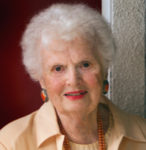By Natasha Josefowitz, ACSW, Ph.D.

LA JOLLA, California — For more than a year I have not left my apartment except for a couple of medical appointments; also, no one has come to visit. Newspapers recount more frequent instances of depression, anxiety and suicide due to the pandemic’s mandates to shelter at home.
Teenagers and seniors seem to suffer the most from this lack of contact—for teenagers it is with peers, while for seniors it is with family. Recent research has shown that part of the brain that fires up when hungry for food is exactly in the same area as that which lights up when hungry for human contact.
Living in a retirement community, prior to COVID, I used to have opportunities for multiple contacts throughout the day—meals with friends, small and large meetings, group exercises and outings, family and friends visiting. What I miss the most are the interactions with others, the easy sharing of ideas, of feelings, commenting on the daily news—all these fed me and often ended within the pages of my columns. I miss this input! The intimacy of good friends meeting together in a predictable routine, like daily breakfast with the same group over the years, creates bonds that can sustain us in times of difficulties. Now all this is gone.
In trying to identify what price I am paying for this lack of human contact, I have noticed that I am slowing down physically. I walk slower and sit too long, thus losing muscle mass even though I exercise via Zoom. The motivation to leave my chair is lacking; the more I sit, the more I want to sit.
As a result of my world having shrunk, I find myself getting more upset at minor glitches. I have become more irritable, especially with technology when it is not responding as it should, which of course happens a lot. Just this morning I could not figure out how to log into a meeting via Zoom; I actually felt my blood pressure rising.
On the other hand, surprisingly, I am finding a new way of living, a new way of being. I have worn the same few comfortable outfits the entire year. What I use in my kitchen is also revelatory. I have several knives hanging from a magnetic strip, but I use the same favorite knife for everything. I also use the same dish, fork and spoon. My routine does not change from day to day; it feels comfortable in its predictability. So the lesson I am learning is how little I need in terms of material goods. I am aware of having lived in a consumer society and having responded to the urge to buy. The catalogs still come in the mail, but I have no need to look through them.
Many male friends are happy to spend more time with their wives and children since they are working from home. My daughter calls almost every night; it is a treat to share our daily activities or what we had just read or thought. My grandchildren have Face Timed and Zoomed with me more frequently than before the pandemic so I have become privy to the babies’ first steps and first words. I have five great-grandsons and see them often in their various stages of development. “Say hi to your great-grandma.” I get a smile and a wave via Face Time.
There is also more social media contact with far away friends and extended family members than previously. I enjoy capturing the minutiae of other people’s lives through emails flying back and forth throughout of the day. I have scheduled weekly Zoom meetings with a few friends to try to stay in touch and share our thoughts and concerns. Still it is not the same; I miss the in-person contact, the hug, the hand on the shoulder, the closeness of sitting together.
The question is how much of my old self will I return to? Will I stay in alignment with the lessons learned during the pandemic? The push to return to the former normal may be inexorable at first, but I am aware of having become a different person—more introspective, more reflective, quieter. I always thought of myself as an extrovert—out there, visible—but I have found an introvert within myself, content with the silence. I like this new part of myself that has emerged, and I want to keep it around, even once my old self gets the chance to get back out into the world.
© Natasha Josefowitz. This article appeared initially in the La Jolla Village News. You may comment to natasha.josefowitz@sdjewishworld.com